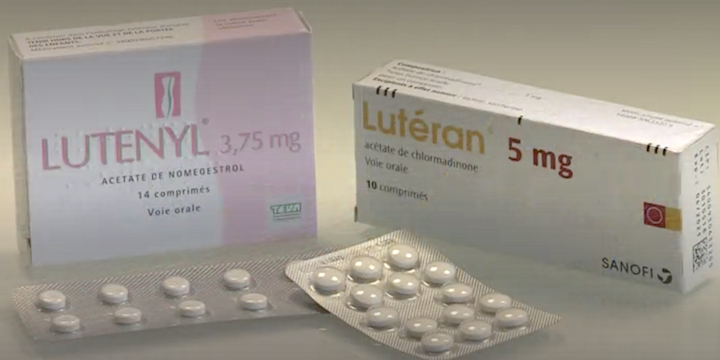Two progestin-only treatments, the same risk of brain tumor. Lutényl and Lutéran are well associated with an increased risk of meningiomas, confirms on April 20 the National Medicines Safety Agency (ANSM), who publishes two reports on April 20 pharmaco-epidemiological.
A strong association, which depends on the dose
These reports are based on two observational studies conducted by the scientific interest group (GIS) Epi-Phare. In both cases, these studies conclude that there is a strong, dose-dependent association between the prolonged use of nomegestrol acetate (Lutenyl and generics) and chlormadinone acetate (Lutéran and generics). ) and the risk of meningiomas.
While meningiomas are usually non-cancerous tumors, they compress certain areas of the brain and most often require risky surgery for the patient.
The studies also confirm that the risk reduction is noticeable after stopping treatment.
18.5 cases per 100,000 people with Lutéran
In detail, the results obtained on these two molecules are comparable. For Lutéran, the experts analyzed data from 1,057,392 women aged 10 to 70 living in France who started treatment between 2007 and 2017. They were classified into two groups, “exposed” or “very slightly exposed”. “, depending on the doses they received.
In the “exposed” group, the incidence of meningioma was 18.5 per 100,000 people per year, compared to 6.8 per 100,000 people per year in the “very slightly exposed” group.
19.3 with Lutenyl
For Lutényl, the experts relied on data from 1,060,779 women aged 10 to 70 living in France who started treatment between 2007 and 2017.
The “exposed” group had an incidence of 19.3 cases of meningioma per 100,000 people per year, compared to 7.0 per 100,000 in the “very slightly exposed” group.
The still unknown biological mechanism
In these two reports, the experts observe that “meningiomas located in the anterior and middle part of the base of the skull were particularly associated with prolonged exposure“to either of these molecules.
For these scientists, “all the elements characterize a causal relationship even if the underlying biological mechanism is not yet fully known “.
Brain MRI monitoring
While waiting to understand this mechanism, the ANSM confirms its recommendations issued in January 2021: to restrict the indications for these treatments to only cases of disabling breast pain, endometriosis and hemorrhages linked to uterine fibroids.
For these three situations, “the treatment should be as short as possible AND the benefit / risk ratio should be reassessed at least once a year“then decided the ANSM. And for women under treatment, regular monitoring by brain MRI should also be set up.
Lutenyl and Lutéran should no longer be used against menopausal disorders, against menstrual cycle irregularities or premenstrual syndromes, against non-severe breast pain or as contraception.
In 2019, these two progestogen treatments were taken by more than 400,000 women in France to relieve menstrual disorders or symptoms of menopause.
 Cherry tomatoes contaminated with salmonella: 92 sick and 1 dead
Cherry tomatoes contaminated with salmonella: 92 sick and 1 dead  A better coaching method can make a person grow
A better coaching method can make a person grow  What is the method to prevent diabetes in children?
What is the method to prevent diabetes in children?  What are the effective factors in causing stomach ulcers?
What are the effective factors in causing stomach ulcers?  Why do embarrassing memories seem to appear at night?
Why do embarrassing memories seem to appear at night?  The amazing link between SARS-CoV-2 infection and newly started diabetes
The amazing link between SARS-CoV-2 infection and newly started diabetes  WHO says monkey pox is not a global emergency right now
WHO says monkey pox is not a global emergency right now  Single cell RNA sequencing uncovers new mechanisms of heart disease
Single cell RNA sequencing uncovers new mechanisms of heart disease  Hepatitis of unknown origin: 3 new deaths and 228 cases worldwide
Hepatitis of unknown origin: 3 new deaths and 228 cases worldwide 